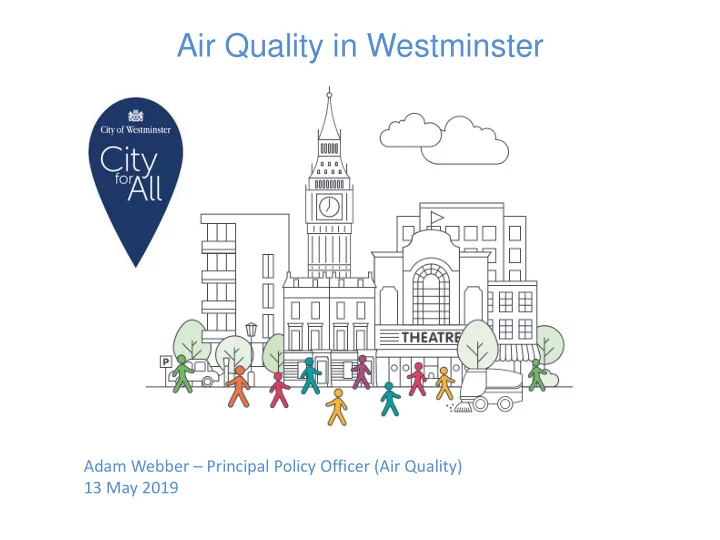

Air Quality in Westminster Adam Webber – Principal Policy Officer (Air Quality) 13 May 2019
Overview Context • Air pollution in London and Westminster • Sources of pollution • Impacts of pollution • Policy and strategy framework Policies and projects • #Dontbeidle • Marylebone Low Emission Neighbourhood • Diesel parking surcharge • Oxford Street District • Schools’ Clean Air Fund Next steps and questions
Sources of pollution
Impacts of pollution • Health impacts of poor air pollution are increasingly well understood • Exposure to poor air pollution has been conclusively linked to asthma incidences, COPD incidences and other respiratory diseases, and increasingly to brain and cognitive diseases • 9,400 equivalent premature deaths in London in 2010 from two major pollutants • Research is now linking pollution to all kinds of other societal / health impacts, including: – Exam results – Incidences of dementia – Depression and mental health issues in young people – Petty crime
Projects and policies Schools’ air Trial and roll audits & #DontBeIdle out of Diesel Clean Air Campaign Surcharge Fund Oxford Marylebone Street LEN
#Dontbeidle • Over 14,000 individuals have signed our Dontbeidle campaign pledge, which pledges drivers to avoid unnecessary emissions from vehicle idling. • This year we have just launched phase 2 of the campaign, which is focusing on large fleet operators through a combination of board room level pledges and training for drivers. Deliveroo were one of the first companies to sign up. • Free kits and downloadable packs available for residents online
Marylebone LEN • Low Emission Neighbourhoods are GLA funded area based schemes focusing on strong partnerships with stakeholders and trialling innovative new projects and policies • £1m match funded by Westminster and partners; project ended in April 2019. • The diesel parking surcharge was first trialled in the Marylebone LEN. Other major projects include anti-idling events and campaigning, work with schools in the LEN area, pioneering ‘backpack monitoring’ to identify personal exposure to pollution in the LEN.
Diesel parking surcharge • After a successful trial of a 50% surcharge on pay to park fees for older diesel vehicles in the Marylebone LEN last year, last autumn we consulted on rolling out this policy across the city • The trial in parking zone F (analogous to the Marylebone LEN) saw a 16% reduction in older diesel vehicles parking in the area, with no displacement to neighbouring areas • We received 1300 responses to the consultation • We’re now rolling this policy out city -wide
Oxford Street District • Much stronger and more holistic focus on Oxford Street district than previous TfL proposals • Residents’ and businesses’ concerns about displacement of traffic and pollution was one of the reasons that the council moved away from the TfL full pedestrianisation scheme
Schools’ Clean Air Fund • £1m scheme announced by the leader of the council last year to provide funds for schools to tackle pollution in their immediate areas • Interventions will be based along three key themes: – Reducing emissions from local roads and highways – Reducing emissions from school buildings and improving indoor air quality – Green planting and infrastructure • As well as this £1m, Westminster is setting aside around £500,000 to fund Air Quality Audits for all Westminster schools. These audits will provide schools with the recommendations for them to apply to the £1m Schools’ Clean Air Fund
What these examples say about our approach • Working in partnership with stakeholders • Maximising external funding • Showing leadership • Focusing on hotspots and where pollution is worst • Creating a positive message • Understanding our opportunities and constraints
Next steps for Westminster New Westminster Clean Air Action Plan 2019-24 due for public consultation later this year City Plan 2019-2040, including Supplementary Planning Documents on the Environment Westminster Energy Strategy to be launched later this year
Next steps for Westminster New Westminster Clean Air Action Plan 2019-24 due for public consultation later this year City Plan 2019-2040, including Supplementary Planning Documents on the Environment Westminster Energy Strategy to be launched later this year
Final thoughts and questions Air pollution as a public health problem rather than an environmental problem Income and age inequalities of air pollution – how do we influence those who are traditionally hard to reach? Issues I didn’t have time to address: electric vehicle charging infrastructure; emissions from new developments and construction sites; Westminster’s lobbying work for a new national Clean Air Act; trialling innovative new monitoring technologies across the borough; helping residents take action to reduce their emissions and reduce their own exposure to pollution; how can we tackle emissions from wood burning stoves? Long-term trend for pollution is downward Current major policy focus is on road transport. As this declines will the relative importance of household emissions go up? Constraints for local authorities
Contact Adam Webber Principal Policy Officer (Air Quality) awebber@Westminster.gov.uk airquality@Westminster.gov.uk Westminster Air Quality webpage: https://www.westminster.gov.uk/air-pollution #DontbeIdle project webpage: https://www.westminster.gov.uk/dont-be-idle Information on Electric Vehicle charging points: https://www.westminster.gov.uk/electric- vehicles
Recommend
More recommend